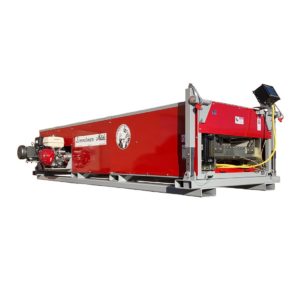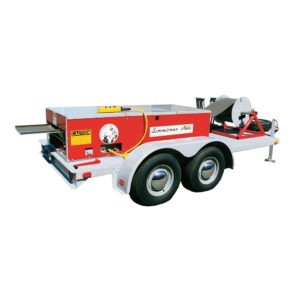5 Reasons Roofing Contractors Should Invest in a Portable Rollforming Machine

Taking the next step to expand a roofing construction business can be full of uncertainty. Some of these doubts revolve around investing in the equipment necessary to expand. Which machinery will bring the most return on investment? Is this the same equipment needed to fulfill customer requests? How can it be used to its maximum potential?
For metal roofing contractors, investing in a portable rollforming machine can give a company more control over its materials, services and installation times. But is it really worth it? The following will explore five benefits of portable rollforming machines and how they can help a contracting business reach the next level in roof construction.
1. Lower costs and reduced installation times
One of the most touted benefits of portable rollforming machines is that they help lower costs while shortening installation times. With this equipment, contractors only need to purchase metal coil, saving on production, shipping and service fees. Since coil can be easily stored, contractors can order back stock to be shaped into any profile for shorter lead times when compared to ordering panels.
These benefits can give contractors an advantage when negotiating contracts and allow them to deliver exceptional services, increasing business and the ability of a company to take on new jobs.
2. Decrease onsite waste
Portable rollforming machines also help contractors use materials more efficiently. Preformed panels can be limited to certain sizes. When they’re trimmed onsite to fit a project’s specific dimensions, crews can often be left with easily damaged excess material that more than likely will not be able to be used. Portable rollforming allows contractors to form panels to exact lengths, so they only use the material they need for a project. Not only does this help maximize yields on material purchases but it is also more ecologically friendly.
3. Meet customer demand with a wider variety of profiles and lengths
Since portable rollforming machines can shape metal coil into almost any profile, it can provide speedy service to projects requiring specific profiles. As such, it can sideline delays from having to order a particular profile. The freed-up storage space allows contractors to invest in a larger range of coil materials and colors—to offer more options to potential customers.
Likewise, because these machines can create longer panels, they can complete larger than standard roofing projects with fewer seams. For customers, this translates to a more aesthetically pleasing and higher performing roofing system. For contractors, this simplifies projects for increased efficiency.
4. Sideline potential shipping damage
Contractors with portable rollforming machines have more control over their materials, quickening install times and more. Because formed panels can be easily damaged in transport, they may arrive unfit for installation. Damaged panels can halt a project, frustrating customers and contractors alike. This can lead to poor reviews and potential delays of future projects, both of which directly affect a business. Portable rollforming machines ensure this risk is a thing of the past to help contractors more easily satisfy customers and increase the number of projects they take on.
5. Diversify business with a cut and drop model

While most of the benefits of a portable rollforming machine are directly related to a contractor’s ability to provide premium services to residential and commercial customers, there is also an indirect way contractors can improve their business. With the power to manufacture roofing panels, contractors can diversify their services with a cut and drop business model.
A cut and drop business model lets roofing contractors form and cut roofing panels for other contractors—without having to purchase materials or install them. Instead, a contracting company only needs to provide the rollforming equipment.
This means contractors can become fabricators for other contractors, which easily boosts profits. Not only does this turn potential competition into customers, but it also helps companies generate income with a minimal crew.